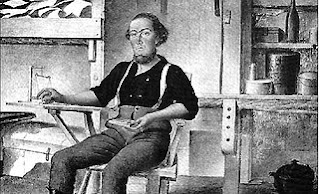Treaty: Portage des Sioux, 1815
Throughout the 18th century, North America was a pawn in the hands of European colonial powers, who frequently fought wars over how land an ocean away was to be divided up. What we in America know as the French and Indian War (1755-1762), the American Revolution (1775-1783) and even the War of 1812 (1812-1814), were actually parts of wider conflicts regarding division of land. When each war concluded, treaties were drawn up. While they disposed of which European power got what chunks of real estate, the treaties rarely dealt with the needs or desires of the people most involved, the Natives who actually lived here.
The Treaty of Ghent which ended the War of 1812 required the signatories, principally the United States, to "restore to such tribes or nations respectively all the possessions, rights and privileges which they may have enjoyed or being entitled to in 1811." With such ambiguity, the treaty left the aforesaid rights, possessions and privileges open to interpretation. With British influence confined to what is now Canada, the United States set about defining what exactly the Native tribes were entitled to. Agents were appointed to treat with the various tribes. Among them were William Clark, of Lewis and Clark fame, and members of the Chouteau family of St. Louis. The Chouteau were respected French traders who were known to many of the tribes. Auguste Chouteau, William Clark and Ninian Edwards met at St. Louis and opened parleys with the leaders of several Native tribes. Based on these negotiations, a series of treaties were signed from July 18-September 16, 1815. While some signings did take place in St. Louis, others took place at Portage de Sioux, Wisconsin.
Among those signing at Portage des Sioux were representatives of the Potawatomi, Piankeshaw, Lakota, Omaha, Kickapoo, Osage, Sac, Fox and Iowa. Even as they signed these treaties, many Native leaders were not pleased by the terms of the agreements. Some, such as Black Hawk of the Sac felt that their agreement was the result of misrepresentation and duress. It would take further negotiations with each of the tribes to implement any of the Portage des Sioux agreements.
The Treaty of Ghent which ended the War of 1812 required the signatories, principally the United States, to "restore to such tribes or nations respectively all the possessions, rights and privileges which they may have enjoyed or being entitled to in 1811." With such ambiguity, the treaty left the aforesaid rights, possessions and privileges open to interpretation. With British influence confined to what is now Canada, the United States set about defining what exactly the Native tribes were entitled to. Agents were appointed to treat with the various tribes. Among them were William Clark, of Lewis and Clark fame, and members of the Chouteau family of St. Louis. The Chouteau were respected French traders who were known to many of the tribes. Auguste Chouteau, William Clark and Ninian Edwards met at St. Louis and opened parleys with the leaders of several Native tribes. Based on these negotiations, a series of treaties were signed from July 18-September 16, 1815. While some signings did take place in St. Louis, others took place at Portage de Sioux, Wisconsin.
Among those signing at Portage des Sioux were representatives of the Potawatomi, Piankeshaw, Lakota, Omaha, Kickapoo, Osage, Sac, Fox and Iowa. Even as they signed these treaties, many Native leaders were not pleased by the terms of the agreements. Some, such as Black Hawk of the Sac felt that their agreement was the result of misrepresentation and duress. It would take further negotiations with each of the tribes to implement any of the Portage des Sioux agreements.




Comments
Post a Comment